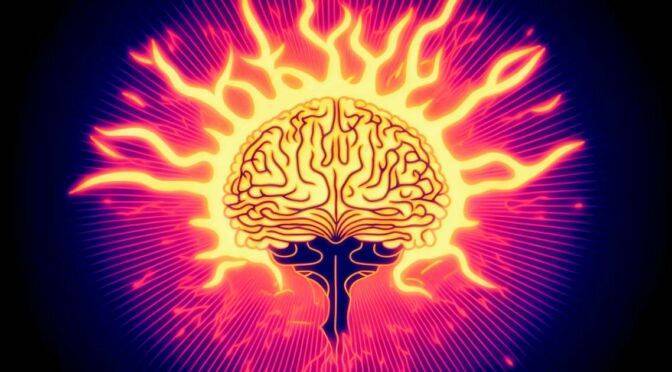18 new studies show that you can increase the chances you’ll reach your goals through a thought-technology called ‘mental contrasting’.
How to Practice Mental Contrasting
First, vividly imagine all the glorious benefits you’ll experience once you reach your goal. Then, with equal intensity, visualize all of the stupid obstacles that could get in your way. Don’t let those obstacles bring you down. Associate them with activities that will help you overcome them.
Apparently, when people face obstacles, they tend to avoid them. Obstacles feel gross, irritating, or scary. So our brains associate the challenges accordingly as something to stay away from.
But, if you practice mental contrasting, you’ll be less likely to associate obstacles with avoidance and more likely to think of them as ingredients you need to julienne for your delicious goals.
A study investigated this. Participants were asked to reflect on an interpersonal concern, such as a conflict with their partner. They were to specify a positive consequence they’d experience if the concern resolved – such as feelings of warmth and harmony. Then, they were asked to specify a word that represents an obstacle to this result – such as jealousy – then a word that represents a behavior they could put in place to override this obstacle – such as distraction. Finally, they imagined the positive consequence and the obstacle as vividly as possible.
One control group was given a variation on the same instructions. They imagined the obstacle before the benefits of attaining their goal. Yet another control group was told to imagine random stuff.
After this exercise, participants got to decide whether a string of characters was a legitimate word or not. Before each string appeared, another word was presented subliminally (that is, too rapidly to register). The target word was the behavior – such as ‘distraction’, and the prime was either the obstacle- such as ‘jealousy’, or another word.
Those that engaged in mental contrasting recognized the behavior more rapidly if followed by the obstacle.
The obstacle was more associated with the behavior.
When individuals enjoy positive fantasies only, they neglect vital information. In particular, they feel motivated to overlook complications and other insights they perceive as undesirable.
Yet, with mental contrasting, ideas that epitomize challenging realities or obstacles get translated by the brain as ideas that epitomize inspiring future possibilities. Consequently, individuals become more aware of how the challenging realities are obstacles to future possibilities. Their motivation to override these obstacles thus increases.

Dive Deeper
When planning is not enough: Fighting unhealthy snacking habits by mental contrasting with implementation intentions. Adriaanse, M. A., Oettingen, G., Gollwitzer, P. M., & Hennes, E. P. (2010)European Journal of Social Psychology, 40, 1277-1293.
Mental contrasting facilitates academic performance in school children. Motivation and Emotion Gollwitzer, A., Oettingen, G., Kirby, T., Duckworth, A., & Mayer, D. (2011).35, 403-412. doi:10.1007/s11031-011-9222-0.
The emergence of goal pursuit: Mental contrasting connects future and reality. Kappes, A., & Oettingen, G. (2014). Journal of Experimental Social Psychology, 54, 25-39.
Mental contrasting instigates goal pursuit by linking obstacles of reality with instrumental behavior. Kappes, A., Singmann, H., & Oettingen, G. (2012). Journal of Experimental Social Psychology, 48, 811-818. doi:10.1016/j.jesp.2012.02.002
Wishful Information preference: Positive fantasies mimic the effects of intentions. Kappes, H. B., & Oettingen, G. (2012). Personality and Social Psychology Bulletin, 38, 870-881. doi: 10.1177/0146167212446163
The projection of implicit and explicit goals. Kawada, C., Oettingen, G., Gollwitzer, P. M., & Bargh, J. A. (2004). Journal of Personality and Social Psychology, 86, 545-559. doi:10.1037/0022-3514.86.4.545.
Mental contrasting promotes integrative bargaining. International Journal of Conflict Management
Kirk, D., Oettingen, G., & Gollwitzer, P. M. (2011). , 22, 324-341.
Expectancy effects on behavior depend on self-regulatory thought. Social Cognition
Oettingen, G. (2000). , 18, 101-129. doi:10.1521/soco.2000.18.2.101.
Oettingen, G. (2012). Future thought and behavior change.
In W. Stroebe, & M. Hewstone (Eds.), European Review of Social Psychology, 23. (pp. 1-63). doi: 10.1080/10463283.2011.643698.
Effective self-regulation of goal attainment. International Journal of Educational Research,
Oettingen, G., Honig, G., & Gollwitzer, P. M. (2000). 33, 705-732. doi: 10.1016/S0883-0355(00)00046-X.
Mental contrasting turns positive feedback on creative potential into successful performance.
Oettingen, G., Marquardt, M. K., & Gollwitzer, P. M. (2012). Journal of Experimental Social Psychology, 48, 990-996. doi:10.1016/j.jesp.2012.03.008.
Mental contrasting of future and reality: Managing the demands of everyday life in health care professionals. Journal of Personnel Psychology
Oettingen, G., Mayer, D., & Brinkmann, B. (2010). , 9, 138-144. doi:10.1027/1866-5888/a000018.
Mental contrasting and goal commitment: The mediating role of energization.
Oettingen, G., Mayer, D., Sevincer, A. T., Stephens, E. J., Pak, H., & Hagenah, M. (2009) Personality and Social Psychology Bulletin, 35, 608-622. doi:10.1177/01461672 08330856.
Self-regulation of commitment to reduce cigarette consumption: Mental contrasting of future with reality
Oettingen, G., Mayer, D., & Thorpe, J. S. (2010). Psychology and Health, 25, 961-977. doi:10.1080/08870440903079448.
Turning fantasies about positive and negative futures into self-improvement goals. Motivation and Emotion
Oettingen, G., Mayer, D., Thorpe, J. S., Janetzke, H., & Lorenz, S. (2005). , 29, 237-267. doi:10.1007/s11031-006-9016-y.
Self-regulation of goal-setting: Turning free fantasies about the future into binding goals.
Oettingen, G., Pak, H., & Schnetter, K. (2001). Journal of Personality and Social Psychology, 80, 736-753. doi:10.1037/0022-3514.80.5.736.
Mental contrasting and the self regulation of helping relations.
Oettingen, G., Stephens, E. J., Mayer, D., & Brinkmann, B. (2010). Social Cognition, 28, 490-508. doi: 10.1521/soco.2010.28.4.490.
Mental contrasting and transfer of energization. , 40, 139-152. doi: 10.1177/0146167213507088
2-3X Your
Learning Speed

Can Too Much Happiness Harm You?
Being happy is a great idea. BUT there are some gotchas to look out for if you’re a tad TOO

“Chunking”: The Real Secret to Effective Communication
Ever notice that sometimes people don’t communicate well? One of the main culprits is a specific limitation of the human

‘Observe the Heart’ Creates Beautiful Visuals from Meditating Brains
SHI Weili created a new, brain-wave-driven art installation called Observe the Heart. The piece aims to make manifest one’s inner experience

Research Suggests Sunshine Helps Your Mind Stay Sharp
According to a recent study by Duke University, getting sun can help keep your mind sharp. One of the benefits


Can you remove the social media buttons on the right (tablet view)? I get that you want me to share it, but it would be good if I could read it first without have to scroll what I want to read to the top or the bottom of the page. The share buttons are at the to of the page anyway!
Done. Thanks for the feedback, Marc!
Wow great article. But, I don’t get it.
If someone could explain what the target and prime meant that would be great, haha.
Glad you enjoyed it! The prime was the the "obstacle word" that was flashed subliminally. The target was the "strategy word" formed to overcome the obstacle.